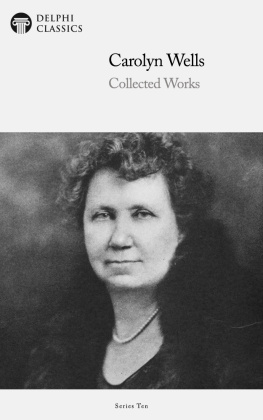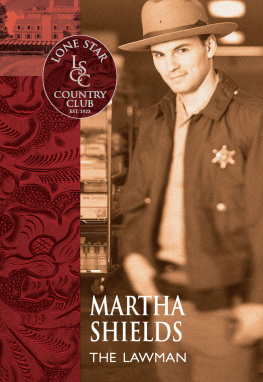This edition is published by BORODINO BOOKS www.pp-publishing.com
To join our mailing list for new titles or for issues with our books borodinobooks@gmail.com
Or on Facebook
Text originally published in 1962 under the same title.
Borodino Books 2017, all rights reserved. No part of this publication may be reproduced, stored in a retrieval system or transmitted by any means, electrical, mechanical or otherwise without the written permission of the copyright holder.
Publishers Note
Although in most cases we have retained the Authors original spelling and grammar to authentically reproduce the work of the Author and the original intent of such material, some additional notes and clarifications have been added for the modern readers benefit.
We have also made every effort to include all maps and illustrations of the original edition the limitations of formatting do not allow of including larger maps, we will upload as many of these maps as possible.
MEMOIRS OF A LAWMAN
by
Cyrus Wells Shores
Edited by
WILSON ROCKWELL
PREFACE
In January, 1957, I received a letter from Mrs. Lucille B. Hartman of Denver which read:
There has come into my possession the personal memoirs of Cyrus Wells Shores, better known as Doc Shores. He was my great uncle and I was brought up on his stories.
While discussing the matter with two of my uncles, Lee Savage and Harry Savage, your name was mentioned as an authority on the history of the Western Slope. They both felt that only a writer of your experience could utilize this material to its fullest possibility. The rewriting and publishing of these stories would make a very substantial contribution to the knowledge of early western life.
Cyrus Wells Shores was born in Michigan in 1844. As a boy he was more interested in the woods than in his books. As a young man he went to Montana via a steamer and paid passage by hunting game along the route. After prospecting and hunting in Montana he worked in Wyoming hauling ties for the railroad. Later he drove cattle up from Texas. After many experiences with Indians, blizzards, and rustlers in Kansas he took his wife and settled in Gunnison. He was sheriff of Gunnison County from 1884 until 1892 when he moved to Grand Junction and was employed by the Rio Grande Express
I, of course, was interested in seeing these memoirs of one of Colorados most celebrated early-day peace officers, and I so advised
Mrs. Hartman. She sent me around eighty manuscripts, some of great length, which Doc had written about his varied experiences on the frontier. It was genuine source material which had never been tappedlike stumbling on to a hitherto unknown personal autobiography of Butch Cassidy or Wyatt Earp. While the accounts were poorly written, the facts were there, and in checking through contemporary newspaper reports, I found them to be remarkably accurate.
I have digested and rewritten these memoirs, still using the first person since I stayed religiously within the spirit and detail of the original version. I did occasionally supply missing facts from other source material. To illustrate, in writing about the train holdup near Grand Junction, Shores fails to mention how the bandits held up the train. The Rocky Mountain News dated Nov. 4, 1887, gives a full account of the robbery, and, to round out the story, I took the liberty of supplying this important detail, giving the newspaper due credit in the footnotes.
Docs excellent memory was occasionally at fault. To cite an example, in his recounting of the Cotopaxi train robbery near the Royal Gorge, he called one of the robbers he arrested Burt McCarty. All other accounts of this case, including the one by the reliable historian Jay Monaghan in his book Last of the Bad Men , refer to this outlaw as Burt Curtis. I have corrected such obvious errors in my revision.
Another important task in recomposing Shores extensive memoirs was the condensation and selection of material. I discarded the lesser stories and combined many which were related. Footnotes at the end of each chapter specify where I obtained my information.
In dealing with Shores thirty-year career as an investigator and peace officer in part II of this book, I have limited his activities to the eight years he was sheriff of Gunnison County. They are a good cross section of his diversified adventures in the criminal field, and mark the highlight of his colorful life. In so doing I have omitted a good many interesting cases which he encountered as a special investigator for the railroads and as chief of police of Salt Lake City. These accounts may also be found in their unedited form at the Western History Department of the Denver Public Library.
Doc Shores wrote his memoirs in the latter part of the 1920s when he was more than eighty years old. After their completion he went to New York City to offer them to a publisher. He staunchly refused to have the manuscripts edited, and the publisher would not accept them without revision. Indignant, Shores returned home and filed his memoirs away.
After his death in 1934, they came into the possession of his older son, Frank, who did nothing with them. When Frank died unexpectedly in December, 1948, a note was found with the manuscripts bequeathing them to Lucille Burch Hartman and Louis Burch, grand-niece and grand-nephew of Doc Shores, who as children provided Doc with an enthusiastic and ever-ready audience. Upon completing this book, I persuaded Lucille and Louis to turn the documents over to the Western History Department of the Denver Public Library for reference and safekeeping.
TABLE OF ILLUSTRATIONS
Doc Shores as sheriff
Gunnison in 1881
River steamer on Missouri River in 1867
Bull Train leaving Fort Benton
Bullwhacker with whip
Wagon train circled for night camp
Herd of Longhorns, 1871
Herd of cattle crossing river
Indians appropriating stray cow
Cutting out cattle
Herd of cattle threatened by blizzard
Blizzard in Western Kansas 1871-72
A. E. Buddecke
Stampeded during storm
Trailing cattle to the Missouri River
Gunnisons Main Street about 1883
Grand Junction as it looked in 1887
Jim ClarkTelluride marshal
Main Street of Gunnison
Telluride when Jim Clark was marshal
Six-shooter used by Clark
Tellurides Main Street in 1895
Jim Clarks grave
Montrose Main Street in 1884
Main Street of Crested Butte in 1891
La Veta Hotel
Tom Horn in 1890
Tom Horns grave
Tom Horn in jailers office
Early day saloon
Alfred Packer
Alfred Packers grave
Thomas Hurley grave
Reuben Doves hermitage
Main Street of Montrose
Doc Shores as an older man














